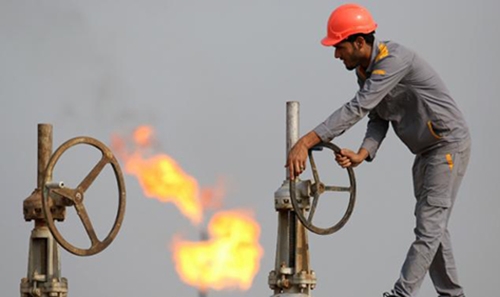GCC debt to double, assets to slide by 2020: report
Public debt of the oil-rich Gulf states is expected to double and assets decline by a third by 2020 as they seek to finance budget deficits due to sliding prices, a report said Tuesday.
After having posted massive deficits of $160 billion last year and faced with a $159 billion deficit in 2016, the six Arab states of the Gulf will have to borrow and tap into their huge fiscal reserves to finance the budget shortfall, said the report released by the head of research at Kuwait Financial Centre (Markaz), M.R. Raghu.
In 2012, in contrast, the Gulf states posted a combined surplus of $220 billion.
The report said public debt of the six-nation Gulf Cooperation Council (GCC) will rise to 59 percent of gross domestic product (GDP) in five years, from 30 percent at the end of 2015.
Fiscal assets of the GCC states which stood at around 140 percent of GDP, or over $2.2 trillion, at the end of last year, is projected to slide to just 100 percent of GDP by 2020, Raghu said.
The GCC groups Bahrain, Kuwait, Oman, Qatar, Saudi Arabia and United Arab Emirates, which together pump around 18 million barrels of oil daily.
Oil income contributed over 80 percent of public revenues before crude prices plunged by around three quarters in value since mid-2014.
"Oil prices could stay low for a long time," Raghu said.
A majority of analysts expect oil prices to average $43 a barrel in 2016 and $55 a barrel next year, he said. The price is way below the level needed by Gulf states to balance their budgets.
OPEC heavyweight Saudi Arabia accounted for the lion's share of the GCC deficits last year by posting a record $98 billion shortfall.
The value of the kingdom's reserves slumped from $732 billion at the end of 2014 to $611 billion at the end of last year, according to Saudi Jadwa Investment.
All the remaining five members have also posted budget deficits and have resorted either to withdrawals from their assets or had to issue bonds to meet the shortfall.
The sharp decline in oil prices is attributed to a production glut mainly because OPEC members led by Saudi Arabia decided to increase supplies in a bid to protect their market share and drive high-cost producers out of the market.
"The Saudi strategy has not been successful so far and may need longer to work," Raghu said.
Photo: Yahoo
Related Posts

